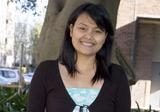From Bali with hope
The Bali bombing of 2002 changed the course of UNSW postgraduate Ni Wayan Rahayu's life; but she was neither a witness nor survivor.
The Bali bombing of 2002 changed the course of UNSW postgraduate Ni Wayan Rahayu's life; but she was neither a witness nor survivor.

The Bali bombing of 2002 changed the course of Ni Wayan Rahayu's life; but she was neither a witness nor survivor.
The 26-year-old UNSW postgraduate was a young English literature student in Denpasar and her university was next door to Sangla hospital, which was overwhelmed by the injured and dead.
Over the weekend of the blast, she says, she was afraid to venture out, like many locals. But on the Monday she went to university and asked her lecturer to cancel classes, then led many of her fellow students next door to the hospital to volunteer. At first she distributed food to exhausted workers, even venturing into the horror of the morgue. But, within a day she was translating, helping Australian counsellors support relatives of the victims and doing everything she could to cushion the trauma of their arrival in Bali under such tragic circumstances.
It was, she says, "a truly shocking experience" which would make her rethink her priorities.
Five years later she was in Sydney for the anniversary of the blast, earlier this month. Wayan is at UNSW studying for a Master of Health Management on an AUSAID scholarship - the campus not far from the homes of many of the Randwick and Coogee victims.
Ever since the chaos of the bombing, Wayan has been determined to improve Indonesia's health system. She worked with an Australian chiropractic clinic before coming to Sydney to study, but wants to take her skills back to make a difference within Indonesia's under resourced public health system.
As an English major it's an unusual career path and a first, she believes, for Indonesia. Traditionally health facilities have been managed by doctors or other health workers. But, she believes there's room for professional managers without a medical background.
She came to UNSW because she already knew its name. Among the volunteers at Sangla hospital five years ago were many UNSW medical staff and students.
"I heard the name and it was familiar to me. I then did my research and found out it was also an A standard course. So I was very happy to come here," she says.
Despite years working with Australians in Bali, this is Wayan's first trip outside Indonesia.
"At first it was a bit hard because you guys speak so fast, now I think my own accent is a bit Australian," she says, laughing, after nine months in Sydney.
One legacy of decades of Australian tourism in Bali, she says, is the availability of plenty of Western food. She made it a point to try it before leaving, just to acclimatise. But, when she arrived in Sydney, she discovered all types of Asian food on campus and all over the city.
Tourism in Bali, says Wayan, still hasn't recovered, and Australian numbers are especially visibly down. The sector survives on local tourism and regional Asian arrival, not the large numbers of Westerners of the past.
"People are still depressed in Bali, especially in the tourist industry. My idea is build better health management in Bali. I really want to get into the public system and create some positive changes," she says of her hopes for her one year post-graduate degree.